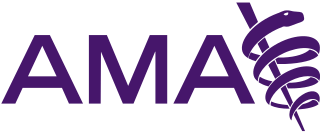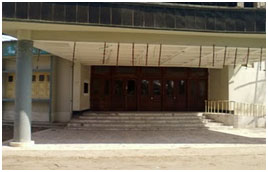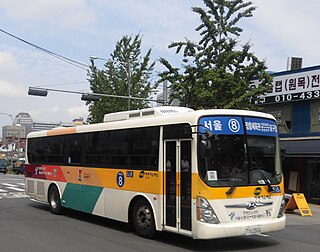
The American Medical Association (AMA) is an American professional association and lobbying group of physicians and medical students. This medical association was founded in 1847 and is headquartered in Chicago, Illinois. Membership was 271,660 in 2022.

The Korean Broadcasting System is the national broadcaster of South Korea. Founded in 1927, it is one of the leading South Korean television and radio broadcasters under the Ministry of Economy and Finance.
Within the National Health Service, resident doctors are qualified medical practitioners working whilst engaged in postgraduate training. The period of being a resident doctor starts when they qualify as a medical practitioner following graduation with a Bachelor of Medicine, Bachelor of Surgery degree and start the UK Foundation Programme. It culminates in a post as a consultant, a general practitioner (GP), or becoming a SAS Doctor, such as a specialty doctor or Specialist post.

The Indian Medical Association (IMA) is a private, national voluntary organisation of physicians in India. It was established in 1928 as the All India Medical Association, and was renamed the Indian Medical Association in 1930. It is a society registered under The Societies Act of India.

Han Duck-soo is a South Korean diplomat, economist, and politician who served as acting president of South Korea from 14 to 27 December 2024 and the 48th prime minister of South Korea from 2022. Since 27 December 2024, Han has been suspended from his presidential and prime ministerial powers following his impeachment by the National Assembly of Korea.

The South Korean mass media consist of several different types of public communication of news: television, radio, cinema, newspapers, magazines, and Internet-based websites.

Healthcare in South Korea is universal, although a significant portion of healthcare is privately funded. South Korea's healthcare system is based on the National Health Insurance Service, a public health insurance program run by the Ministry of Health and Welfare to which South Koreans of sufficient income must pay contributions in order to insure themselves and their dependants, and the Medical Aid Program, a social welfare program run by the central government and local governments to insure those unable to pay National Health Insurance contributions. In 2015, South Korea ranked first in the OECD for healthcare access. Satisfaction of healthcare has been consistently among the highest in the world – South Korea was rated as the second most efficient healthcare system by Bloomberg. Health insurance in South Korea is single-payer system. The introduction of health insurance resulted in a significant surge in the utilization of healthcare services. Healthcare providers are overburdened by government taking advantage of them.

The Institute of Pharmacy, Jalpaiguri, is situated in the district of Jalpaiguri in West Bengal, India. It is situated in the District Hospital Campus in Jalpaiguri Town. It used to be known as Jackson's Medical College. It was created by the then British Government as an auxiliary medical institution to grant medical degrees in 1923. It is the first diploma pharmacy college in India, as it has been granting diploma degrees in Pharmacy since 1920. The school was upgraded to a B.Pharm degree-granting institution in 2003.

Moon Jae-in is a South Korean politician and former lawyer who served as the 12th president of South Korea from 2017 to 2022. Before his presidency, he served as Senior Secretary for Civil Affairs and Chief of Staff to President Roh Moo-hyun, Member of the National Assembly, and Leader of the Democratic Party of Korea.
An outbreak of Middle East respiratory syndrome coronavirus occurred in South Korea from May 2015 to July 2015. The virus, which causes Middle East respiratory syndrome (MERS), was a newly emerged betacoronavirus that was first identified in a patient from Saudi Arabia in April 2012. From the outbreak, a total of 910 cases were infected in the country, with a death toll of 89.

Abortion in South Korea was decriminalized, effective 1 January 2021, by a 2019 order of the Constitutional Court of Korea. It is currently legal throughout pregnancy, as no new law has been enacted. Thus there are no gestational limits or other restrictions.
Samsung, a Korean electronics company, began producing semiconductors in 1974 and has grown to become one of the largest semiconductor fabricators in the world. In the decades following Samsung's entrance into semiconductor fabrication, many of its workers developed serious illnesses, including leukemia, lymphoma, and multiple sclerosis (MS). Beginning in 2007, the families of the impacted workers, with the help of a variety of domestic and international organizations, organized and mobilized against Samsung in the form of various protests and legal challenges. This organized opposition lasted for over a decade and largely concluded upon the signing of a binding settlement agreement between Samsung and the relevant opposition leader. Additionally, Samsung issued a public apology and acceptance responsibility for causing an increased risk of serious illness in its semiconductor factories.

The 2016 National Disability Survey found that there are approximately 2,683,400 people with disabilities in South Korea. Physical disabilities account for about 50% of the total disabled population. In the past few decades, guided by the five-year plan, policies and services related to people with disabilities have improved. The government has established several regional rehabilitation centers for people with disabilities and has provided and implemented rehabilitation programs in their communities. The number of disabled people in South Korea is increasing as the population ages. Regarding this matter, the South Korean government is planning a stable welfare model to adapt to long-term demographic changes.

Korea Disease Control and Prevention Agency, formerly Korea Centers for Disease Control and Prevention, is an organization under the South Korean Ministry of Welfare and Health that is responsible for the advancement of public health by managing prevention, survey, quarantine, trial, and research on infectious diseases, chronic and rare illnesses and injuries. It was founded in December 2003 and is located in Osong Health Technology Administration Complex in Cheongju. The organization is led by the vice-ministerial-level Commissioner of KDCA.
South Korea has been considered a medical tourism destination since 2009, attracting more than 2.76 million foreign patients between then and 2019. The increasing number of patients seeking medical treatment in South Korea do so for multiple reasons, such as low medical costs, high quality medical services, short waiting times, and tourism packages combining relaxation and tourism.

The 2022–present National Health Service (NHS) strikes are several ongoing industrial disputes in the publicly funded health services of the United Kingdom.
In 2020, South Korean medical strike happened when South Korean medical workers went on strike to protest the government's plan to expand admissions to medical schools.
The 2024 South Korean medical crisis is an ongoing healthcare crisis following the announcement of new government policies that would significantly increase medical student admission quotas. Thousands of residents and interns have since resigned, resulting in medical school professors working to cover. This forced non-urgent, less complicated patients to no longer be treated at tertiary care facilities, leading to financial concerns at large university hospitals, as well as public anxiety about timely treatment.
A number of labour strikes, labour disputes, and other industrial actions have occurred in 2024.












